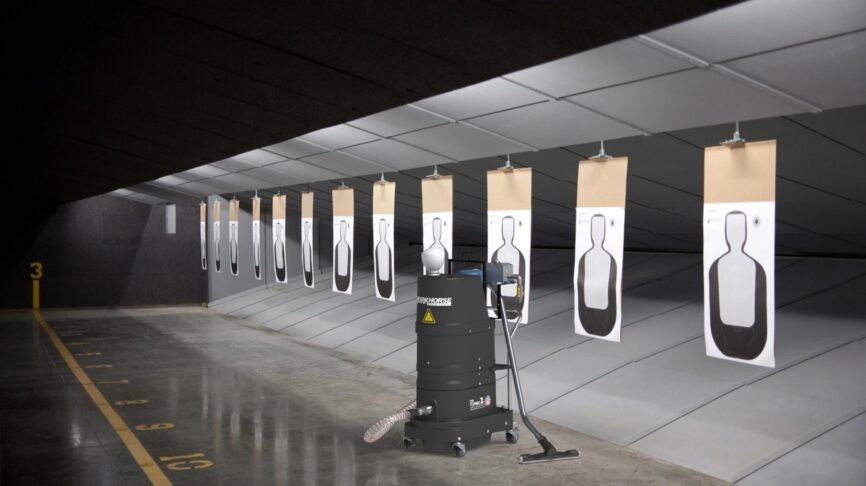Gun safety at the firing range is second nature for most shooters but many may not be aware of the threat of lead exposure and potential health risks. Lead dust and fume exposure affects firing range workers daily and hobby or professional shooters during practice and training. Risks can be greatly mitigated by using best practices and proper gun range maintenance and housekeeping utilizing HEPA filtered vacuums.
How is lead exposure created?
Most ammunition contains lead and when a pistol, shotgun, or rifle is fired small lead particulates and fumes are released into the air. Lead particulate can also become airborne after a bullet strikes a target, backstop, floors, or walls. Additionally, exposure can occur when handling spent casings or cleaning bullet traps. Improper range cleaning or inadequate ventilation can create additional exposure. Several studies have shown that outdoor shooting ranges can have similar exposure concerns.
Why is Lead Dust Harmful?
Lead occurs naturally and can be found in many forms. Most of the lead used to produce ammunition is in its metallic form or in various lead compounds such as “lead styphnate” or “lead azide” used in primers. When absorbed, lead will enter the bloodstream and what is not filtered out can be stored in the bones resulting in harmful health effects over time. Lead can affect important parts of the body including the brain, organs, nerves, heart, etc. The potential risks that can be remedied when firing range operators enforce safe personal hygiene and proper housekeeping measures including the use of a HEPA rated vacuum cleaner.
Who is affected by the presence of lead dust and most at risk?
- Firing range employees
- 3rd Party maintenance or housekeeping providers
- Hobby Shooters
- Competitive & Team Shooting
- Military & Law Enforcement
- Family and friends of range users
There are many ways of protecting workers and shooters by using proper facility standard operating procedures and personal protective measures:
- Daily cleaning
- Proper range ventilation and filtration.
- Regular housekeeping utilizing HEPA filtered vacuums.
- Use lead-free bullets where possible.
- Wear personal protective equipment.
- Use lead removal wipes after shooting.
- Do not prepare or eat food during shooting and keep any beverages sealed.
- Remove outer clothing prior to getting into your vehicle or entering your home or office.
Which Vacuum Should I Use for Lead Dust?
Vacuums should be equipped with efficient primary filtration and include HEPA filtration as a secondary level of protection from the hazardous lead dust. Internal filter cleaning systems should be used to prevent exposure to the operator of the vacuum during use, maintenance, and disposal. In addition, you should consider an industrial vacuum that offers a wide range of accessories for cleaning all surfaces including shooting lanes, floor, walls, and ceiling. Vacuums should be built under strict quality control and engineered to be reliable and durable for indoor and outdoor firing range applications.
Additional considerations:
The environment in which your firing range is located will play an important role in choosing which type of industrial HEPA vacuum cleaner is required. The presence of airborne, unburned, or spilled gun powder has combustible properties that can react differently when placed indoors or outdoors and each facility operator is responsible for choosing which level of protection is required when considering explosion proof vacuum options.


